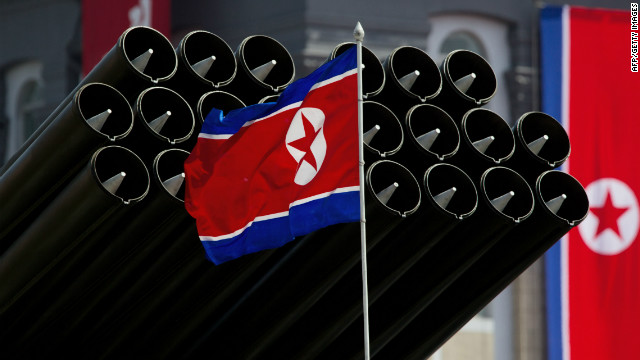
Editor's note: Jennifer
Lind, associate professor of government at Dartmouth College, is the
author of "Sorry States: Apologies in International Politics," (Cornell
University Press). She is a Public Voices Fellow with the Op-Ed Project.
Follow on Twitter @profLind.
(CNN) -- North Korea, China's longtime ally, has
vexed Beijing for years with its rocket launches, nuclear tests,
kidnapping of Chinese fishermen and other erratic behavior. Yet, Beijing
has run interference at the United Nations to temper punishments
against Pyongyang, and has even helped Pyongyang circumvent sanctions.
In the wake of North
Korea's third nuclear test in February, its reckless threats to strike
the United States, and now -- its decision to scrap the armistice that
ended the Korean War -- has China finally had enough?
Beijing signed on to
sanctions that, in the words of Susan Rice, U.S. ambassador to the
United Nations, will "bite and bite hard." China's ambassador to the
U.N. declared Beijing's commitment to "safeguarding peace and stability
on the Korean peninsula."

Jennifer Lind
One shouldn't exaggerate the significance of these recent developments.
After all, in the U.N. negotiations over sanctions -- this time as
before -- the Chinese have consistently played the role of watering down
the degree of punishment imposed against Pyongyang. And in the past
Chinese firms have helped North Koreans evade sanctions. It remains to
be seen whether Beijing intends to enforce the new measures.
Beijing also has good
reasons that continue to make it reluctant to crack down on its unruly
ally. The Chinese perceive that they have a powerful interest in
maintaining the status quo. As hard as it is to live with North Korea,
Beijing fears it may be harder to live without it.
The Chinese worry that
coming down hard on Pyongyang, by cutting off their vital oil or food
exports, could trigger a collapse of the North Korean government or
other political instability on the peninsula. Beijing's nightmares
include a loose nukes problem and a humanitarian disaster.
Beijing also has fears
about the effects of a North Korean collapse on the strategic balance in
East Asia. If North Korea collapsed and the two Koreas unified, China
might find astride its border a unified, U.S.-aligned Korea hosting
American troops.
Chinese analysts also
commonly argue that North Korea serves as an important distraction for
the U.S. military, which might otherwise train its focus on defending
Taiwan.
Thus, despite the
nuisance that North Korea regularly makes of itself, for all these
reasons, it would be sorely missed by Beijing.
But the days of "lips
and teeth" (Mao Zedong's's famous statement about the closeness of
Sino-North Korean relations) are clearly over. Chinese scholars and
analysts increasingly express open frustration with Pyongyang's
behavior. In the wake of North Korean piracy against Chinese fishermen,
Chinese microblogs overflowed with outrage.
Most recently, in a
meeting of an advisory group to the Chinese government -- the Chinese
People's Political Consultative Conference -- participants openly
debated the question: whether to "keep or dump" North Korea?
The two countries have
evolved from vitriolic BFFs to East Asia's odd couple. When China and
North Korea formed their alliance, the countries were both poor, weak,
resentful, isolated, and the target of cold-war containment by the
United States and its allies.
While North Korea is
still that country, China is emphatically not. China's remarkable four
decades of economic reform and growth have catapulted it to wealth and
power -- China is a global power, with global interests. China has a
deep stake in maintaining stability in order to sustain its pathway to
prosperity.
China's relationship
with the United States can be tense. But quite unlike in the days of
Mao, the two countries are vital trade partners that share a vast array
of ties and often overlapping interests.
Beijing also values its
relationship with South Korea, which Pyongyang's provocations seriously
jeopardize. Booming trade flows, warm political relations, and deeply
intertwined ties have created a relationship that makes it increasingly
awkward for Beijing to look away when North Korea murders South Koreans
as it did in 2010 (with the sinking of the South Korean vessel Cheonan
that killed 46 sailors, and when it shelled Yongpyeong Island).
China is a great power
that is increasingly concerned with its standing in the world, and with
cultivating "soft power." Beijing's support for North Korea's ruthless,
bloody regime -- that attacks its neighbors, and brutalizes its people
at home -- only draws attention to China's own human rights failings,
and undermines China's soft power.
Because the specter of
North Korea's collapse could potentially destabilize the Korea
peninsula, Beijing may continue to shield Pyongyang. But the two
country's increasingly divergent interests suggest that China's
dissatisfaction with North Korea is only likely to grow.
Follow us on Twitter @CNNOpinion.
Join us on Facebook/CNNOpinion.
The opinions expressed in this commentary are solely those of Jennifer Lind.
 10:13 PM
10:13 PM
 specialshowtoday
specialshowtoday

 Posted in:
Posted in: 

0 comments:
Post a Comment